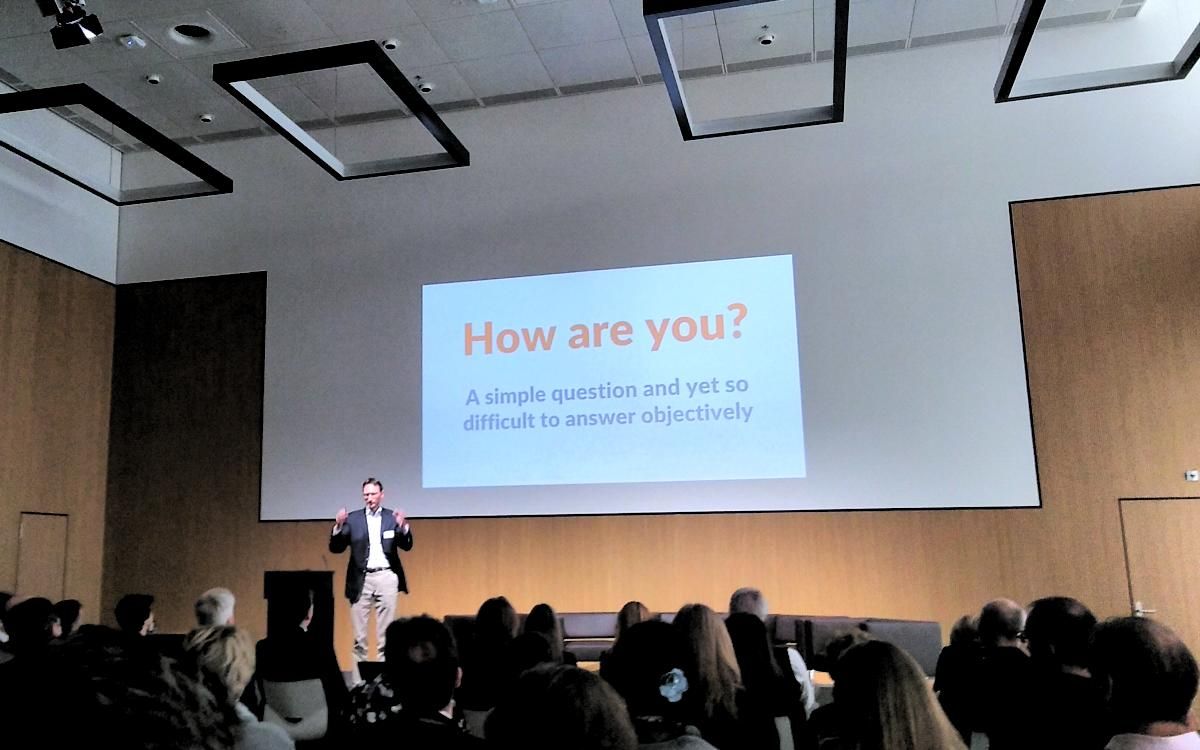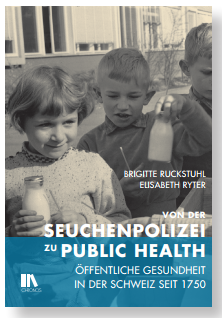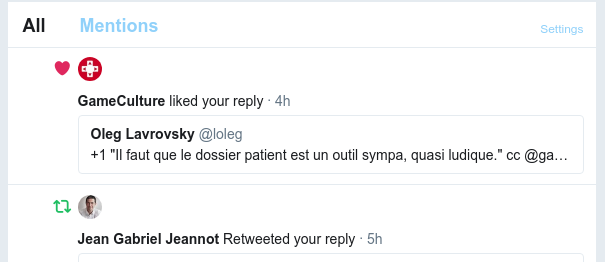037 #publichealth
Notes on a Public-Health.ch symposium about the ways digitization and data access is changing healthcare and the medical profession.

Notes and thoughts from a Public Health Switzerland Symposium in Bern today on "Digitalisierung in Gesundheitswesen", about the ways digitisation and data access is changing healthcare and the medical profession.
Background
Before I get ahead of myself, a quick reach back into the recent past. Since starting out as freelance developer, a large proportion of projects coming my way have at least touched upon medical IT. From apps for pre/post-op therapy and patient-practitioner comms, to analysing statistics and financial ties, I have had several opportunities to study the challenges of integration with clinical systems and Electronic Health Record government programs.
Ideally, most of the time is spent in such projects on understanding the needs of the patient, having conversations to focus on failure points, applying design thinking to marry the needs of therapy to the needs of human users - all while creating logical next-generation workflows for medical practitioners in a highly secure "enterprise-grade" IT environment.
The concern is that we too often exaggerate certain technical priorities, try to meet too many targets, such as overly ambitious data integration requirements. This comes up a lot in open health discussions, with practitioners of data engineering, as well in direct outcome of pilots. Health is personal, and health apps need personality.
In the Synopses project in particular, I gained experience talking to doctors, clinicians, medical innovators, and standards bodies. The startup continues in a new light and renewed focus at resilient.ai:
"We are developing a tool that helps to accurately measure stress, identify individual stressors, stress patterns and predict burnout risk. The system is supervised by a therapist or professional to ensure the best possible outcome. We not only intend to measure the stress levels but also provide coaching based on human-assisted (therapist) computerized Cognitive Behavioural Therapy. Over time this helps people to become more resilient to stress." --Max Grossenbacher
In the meantime, over the past year I have had the privilege of working closely on Web projects with the leading Swiss association for promoting and creating dialogue in Public Health. The Symposium on Digital Transformation of Health Data was a good chance to see how the field is progressing, get up to speed with new perspectives.
Some things have not changed; adoption is rather slow, many IT frustrations are still unsolved. However, many bright minds are out there tackling them (e-health-suisse.ch), in a ripe and rapidly expanding market. My hope is that the business incentives will also drive forward a research and policy agenda that keeps priorities well-balanced on top, and supports a pragmatic basis for transparency and more accessible medical literacy. Speaking of which...
The Symposium

At the entrance a recently published book was being presented that covers the history of public health in Switzerland, with plenty of stats and charts in between its covers. I had a quick leaf through and it seemed well researched, illustrated and written - at least as far as my abilities in German allow me to see. The closing topics on personalised medicine and genetics were relevant, and led me to some interesting web searches. For more about Von der Seuchenpolizei zu Public Health. Öffentliche Gesundheit in der Schweiz seit 1750 by Brigitte Ruckstuhl und Elisabeth Ryter, see public-health.ch.
At a discussion of public and individual health data today in Bern courtesy of @publichealth_ch https://t.co/czfEBqgp24 pic.twitter.com/0Z3se85IuL
— Datalets (@datalets) December 12, 2017
At the start of the event, Claudia Pletscher gave a convincing overview of why the Swiss Post is the best channel for digital & physical transactions. They recently made quite a splash with drones delivering medicine to remote parts of Ticino. Ms. Pletscher talked about core areas of focus, briefly summarised the E-health solutions, and how their partner networks enable optimal data sharing.
Florian Liberatore from ZHAW is talking about ensuring the quality of e-health service providers from a recent paper, talking about the need for new and better data about health services. Some of that cost is currently being offset by Swisscom, who funds part of the research and has a new publication program. You may have already seen this impressive Gesundheitsdaten infographic going around. I found it interesting, albeit not exactly reassuring, to hear from Mr. Liberatore's studies the suggestion that there are on average 40 software packages being used to process a patient file in cantonal hospitals. They studied the data volumes in detail across different branches, trying to prove the same point: there's a huge paper trail.
Up next was Marc-André Giger, a gentleman who works with the consulting group KPMG. He extended the ZHAW study with additional business expectations and some additional convincing study reports to leaf through, this time with a focus on administration and E-government. By the way, this report talks a lot about Open Data and opendata.swiss in particular. Mr.Giger described "Dr.Google" as part of the normal interaction, talked about the Hausarzt (family doctor) of the futrue as "Gatekeeper" and "Coach". And that patients of the future will be choosing between provider-networks with various levels of constraints and costs - a very hot topic in Switzerland.
Jean Gabriel Jeannot, (@jgjeannot spoke next about the role of new media. As the Internet population is "ageing", i.e. involving the full spectrum of the population, he instilled in us the profoundly important idea that it is a public space and not just a technology. And that we have to keep an eye out for alternatives. "Google is nice for the kitchen, for a Christmas recipe, it's maybe not appropriate for a prescription."
@jgjeannot opens his talk on the role of new media in public health with a pulse check of the audience, and it seems we are ready to take on some risks and dive in @publichealth_ch pic.twitter.com/xXuUKSoE4q
— Datalets (@datalets) December 12, 2017
He talked about the role of "useful" apps, mentioning specifically melanoma detection - the applicability of which is highly evident and contested. As patients, we struggle to find high quality health apps. Maybe our doctor could help? He explained the way InfoKids, the Geneva Hospitals app for parents of a patient was designed to provide digital services to connect with the pediatrician, thus fulfilling its true value according to M. Jeannot.

In a particularly inspired moment, he shared his worry that the electronic patient file is more about the "electronic" than "patient" part. His quote "il faut que le dossier patient est un outil sympa, quasi ludique" (the patient file needs to be approachable, almost fun, to use) made me look up health projects at Pro Helvetia, who I would first look to for seeding this kind of aspiration.
Marc Strasser was next on the stage, from the Basel University Hospital executive. I'm afraid I had to temporarily tune out during his presentation, since another association I support was running an event in Lausanne and there were some questions from the team. Nevertheless at least one person I talked to in the break was enthusiastic about some of the points, and I hope to get a chance to revisit the slides.
Eliane Maalouf was up on stage next, inviting us to join a working group to propose a project in the association - I immediately took up the offer, and look forward to hearing more about what this statistician has on her mind in regards to analysing public health data.
The next speaker I was looking forward to hearing from runs one of the top ranked Swiss health wearables startups, as well as aggressively pursuing a public speaking agenda on topics like "Unlocking the power of data": Dr. Andreas Caduff.
"We need information that empowers us" ~@andreascaduff delivers a stellar pitch for health wearables at @publichealth_ch pic.twitter.com/83hnq8iBCY
— Datalets (@datalets) December 12, 2017
Through a bunch of charts he came around to his point: RWE, or Real World Evidence, should be an essential ingredient in modern medicine. That means data from the 99.2% of our lives we spend outside of clinical observation. His product Biovotion is what everyone wants for Christmas, and, I must say, I do have something of a weakness for radial graphs. The ones here are even spiralized!
The big take-home tidbit from the talk, in my English paraphrasing: "A huge problem in our society are people who work hard, maybe do sports, but never recover fully." He puts up a slide contrasting a healthy pattern to a burn-out trend. "They should go to their doctor and put this [points to the app] on the table." The first question from audience made us smile: "so where does one buy this thing?"
Der digitale Patient: Am heutigen .@publichealth_ch -Symposium wurde über die Chancen und Herausforderungen der #Digitalisierung im #Gesundheitswesen diskutiert. pic.twitter.com/Lc0N1I0qYm
— Public Health Schweiz (@publichealth_ch) December 12, 2017
I will leave the cybersecurity and podium discussion for others to cover. It has been an eye opening experience. Events like these help programmers like me keep perspective on the needs of users and complexities of governance, and I believe on the whole contribute to a vision of a healthy technology for a healthy society.
Many thanks to Public Health Schweiz for the chance to take part.

